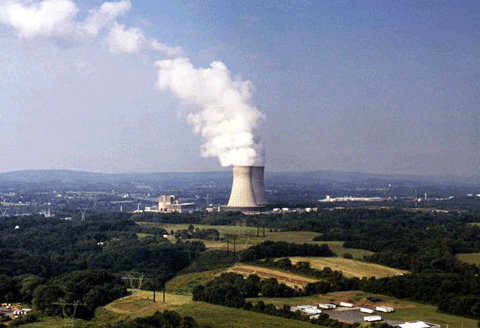Go Nuclear to Avert Climate Change
2 Nov, 2009 02:58 pm
It is proposed by the U.K. government's chief scientific advisor that we should go for nuclear to avert climate change but time and uranium supplies are running short. It is best a short-term solution for fission reactors.
 |
I'm not immediately scared of nuclear power since for the most part nuclear power stations have run quite safely for years, there being only three really bad accidents that come to mind: Three Mile Island, Windscale and Chernobyl. Apart from the nuclear waste, it is a pretty clean technology too, especially in terms of carbon emissions, so I take his point. That said, we need to import uranium, which is enriched somewhere?, and there are issues over potential terrorism, so I am not convinced by the usual "security of supply" argument for nuclear.
It is reckoned too that there is around 40 years worth of uranium in known reserves and so if we are going to go for nuclear, we need to get hold of a lot more of the stuff. Obviously, if we all go four-fold in our adoption of fission-based reactors, that divides into 10 years worth and since it takes about 10 years to get a nuclear power plant up and running from scratch, we may have left it a bit too late.
I agree with Professor Mackay too that renewables are unlikely to provide more than a small fraction of our energy at least in the short term, and yet in the rounder and longer view they are all we have. At the risk of repetition, this reminds that we have to cut our energy use - transportation is an issue in its own right and will begin to decline in the wake of the most precious and vulnerable of fossil resources, namely oil - by a wholesale relocalisation of society. However, if this is not done in a structured way, and no government wants to point out the severity and proximity of the situation for fear of scaring the living daylights out of its electorate and augering-in anarchy, then it is exactly the latter that is likely to prevail upon us.
Related Reading.
"Professor David Mackay: Britain 'must go nuclear' to control climate." By Jonathan Leake: http://www.timesonline.co.uk/tol/news/politics/article6860181.ece
-
12/12/12
ÂPeak Oil is Nonsense Because ThereÂs Enough Gas to Last 250 Years.
-
05/09/12
Threat of Population Surge to "10 Billion" Espoused in London Theatre.
-
05/09/12
Current Commentary: Energy from Nuclear Fusion  Realities, Prospects and Fantasies?
-
04/05/12
The Oil Industry's Deceitful Promise of American Energy Independence
-
14/02/12
Shaky Foundations for Offshore Wind Farms







 Read more
Read more
First, known reserves of fuel are always a small fraction of what's actually available. For example, there are only three years' known reserves of oil in the world but no one believes the world will run out of oil in three years. Nor will the world run out of uranium in forty years, or eighty or whatever it is antinukes are saying now. The data is tabulated here.
The world will use nuclear energy because it will not adapt to part-time electricity sources. It follows that old technology will be abandoned in favor of advanced fuel cycles which will push the available fuel well into the thousands of years.
Second, uranium and thorium are better distributed than oil. Some of the richest sources are located in modern democracies, Canada and Australia being prime examples. So importing uranium will be much less problematical than importing oil from Mideast monarchies and unpredictable dictatorships.
firstly it's nice to hear from you. I repeated those figures from the Sunday Times about 3x the UK's electricity can be got by a four fold increase in our nuclear power because I think they've got them wrong. We get about 20% of our electricity from nuclear don't we, and so we could close to double the amount by 4x the level of current nuclear power; rather than the "threefold" they claim?
As I stress, I am not anti-nuclear at all, but we need to provide enough uranium fuel for it into the future especially if the amount is to be expanded. There are many sources of uranium, especially phosphate rocks, but the EROEI falls as they become less rich.
I will indeed read your book.
Regards,
Chris Rhodes.
it has been reckoned that we would need to build one new wind turbine a day for the next 12 years to meet our carbon emission targets by this technology. http://ergobalance.blogspot.com/2008/06/new-wind-turbine-every-day-for-12-years.html
Hence the scale of engineering is absolutely huge as it is for all kinds of renewable technology, and most of it would need to be built from scratch. Oil will be needed to run vehicles and equipment to maintain them, and materials to build new, unless these machines are all electric or run on hydrogen, which again would take decades.
The loss of oil remains the underpinning problem and its rate of recovery rather than how much may ultimately be recovered.
Regards,
Chris Rhodes.
I am completely in agreement with what you say. Nuclear will certainly remain a vital and substantial component of the energy-mix. The issue of political stability is key. However, do we not need to use oil to run vehicles for mining operations? I'm sure that alternative means will be found over the long time that nuclear will be used and my main point here is that we should begin to seek alternative sources, and to construct thorium based reactors (e.g. the liquid fluoride reactor) since there is around threefold more thorium worldwide than uranium.
What is you view on breeder reactors, which would eke-out uranium supplies for centuries? Using thorium is of course a breeder technology.
Again, in all cases we need a massive swathe of new engineering and technology, and if that is our direction, to begin its inauguration quite rapidly,
Regards,
Chris Rhodes.
Breeder reactors are part of the advanced fuel cycle, and the technology is well-developed, so they are the obvious next phase of nuclear energy along with modern fuel reprocessing.
Motor fuels are the most difficult technology challenge we face in the area of energy. The solution that seems most reasonable from here is some compound based on sustainably-produced carbon that stores hydrogen. It may resemble Green Freedom (find with Google), which is achievable with current technology. But we have to find a solution because vehicle emissions alone exceed what the planet can tolerate. Whatever solution we find will also reduce the emissions resulting from uranium and thorium mining operations.
The headline of your article, taken together with the text, appears to be part of the nuclear/antinuclear debate. But the last paragraph makes an essential and unassailable point, that energy consumption must be reduced. The challenge is to persuade people to accept higher efficiency standards and give up extravagant energy use. Can elected representatives impose strict regimens on the public and still be re-elected?
All the best,
Chris.